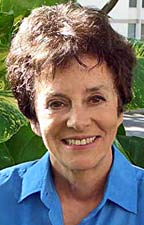Family scholar urges
renaissance of ohana
HILO » Hawaii has retained a family system that the rest of the United States is returning to, the ohana, says family scholar Stephanie Coontz.
![]()

![]()
Stephanie Coontz: She says ohana customs were common in America until 200 years ago
Coontz is the director of research at the Council on Contemporary Families, a professor of family studies at Evergreen State College in Washington, and a part-time resident at Makaha on the Waianae coast.
She is the author of a new book, "Marriage, a History."
Coontz started to understand ohana parenting at an event on Lanai in the early 1980s. Trying to keep tabs on her own young boy, she saw others doing child care differently.
"Nobody else watched their own kids. They just watched whatever kid came into range," she said.
Another time in 1992, a little girl walked up to her at a beach in Hilo and said, "Auntie, I have a sliver."
Coontz pulled it out while feeling kinship with a girl she had never met.
Extended responsibility for children is the way things used to be in America and Europe until about 200 years ago, she said.
Like Hawaii's use of "auntie" and "braddah," extended relatives called each other "cousin" and "friend," she said.
But 200 years ago, people started leaving extended families on the farm or in the village in order to take jobs in cities.
The high point of nuclear families in America is often seen as the 1950s. But people don't realize that was because the government subsidized many of them, she said.
Almost 40 percent of families started in the early '50s were founded by World War II veterans receiving benefits under the GI Bill, Coontz said.
Easier divorce in the 1970s onwards made marriage more fragile, but for marriages that survived, more fulfilling.
When marriages don't survive, the need for a support system like the ohana increases. "We need to get that back," Coontz said.
E-mail to City Desk
[News] [Business] [Features] [Sports] [Editorial] [Do It Electric!]
[Classified Ads] [Search] [Subscribe] [Info] [Letter to Editor]
[Feedback]
